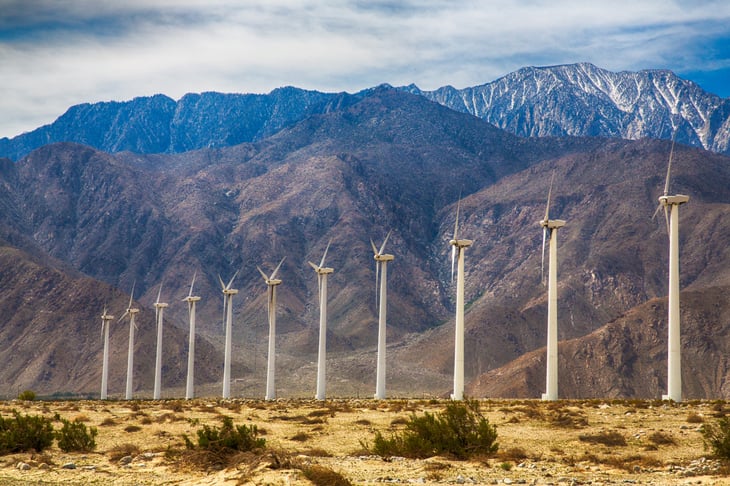
Editor's Note: This story originally appeared on Commodity.com.
Businesses and governments have developed more tools to promote energy efficiency in recent decades. Utilities have developed more efficient technologies for generating energy and moved away from less efficient fuel sources.
Many states and localities have adopted policies like Energy Efficiency Resource Standards or more stringent building codes to ensure continued improvements in energy efficiency. Programs like the LEED (Leadership in Energy and Environmental Design) certification for buildings and the government’s Energy Star certification for consumer appliances have helped raise standards of energy efficiency for many aspects of everyday life.
But one of the biggest factors improving energy efficiency is a shift in the nature of the U.S. economy. Historically, the U.S. generated a far greater share of its economic output from energy-intensive industries like manufacturing.
Over time, more of the economy has shifted toward services and technology, which require far less energy input, and the energy intensity of the economy has declined over time.
According to the U.S. Energy Information Administration, the amount of energy consumption relative to GDP has decreased by 58% since 1950.
Some states are further along than others in advancing energy efficiency goals. Several factors explain why. Many of the leading states have stronger policies and standards regulating energy efficiency in utilities, buildings, or products like vehicles and appliances. Others have sped their transitions away from more inefficient fossil fuels toward efficient renewable sources with new investments and regulations.
To determine the states with the most energy-efficient economies, researchers at Commodity.com analyzed the latest data from the U.S. Energy Information Administration and the Bureau of Economic Analysis. The researchers used this data to rank states by their total energy consumption per GDP. In addition, the total energy consumption per capita, total energy consumption, and total GDP were provided for reference.
Here are the states with the most energy-efficient economies.
15. Oregon

- Total energy consumption per GDP (BTU per dollar): 4,168.3
- Total energy consumption per capita (million BTU per capita): 243.8
- Total energy consumption (trillion BTU): 1,028.1
- Total GDP (billion dollars): $246.65
14. Colorado

- Total energy consumption per GDP (BTU per dollar): 4,019.4
- Total energy consumption per capita (million BTU per capita): 273.8
- Total energy consumption (trillion BTU): 1,576.5
- Total GDP (billion dollars): $392.22
13. Vermont

- Total energy consumption per GDP (BTU per dollar): 4,011.4
- Total energy consumption per capita (million BTU per capita): 219.4
- Total energy consumption (trillion BTU): 136.9
- Total GDP (billion dollars): $34.13
12. Florida

- Total energy consumption per GDP (BTU per dollar): 3,920.0
- Total energy consumption per capita (million BTU per capita): 203.8
- Total energy consumption (trillion BTU): 4,376.4
- Total GDP (billion dollars): $1,116.44
11. Delaware

- Total energy consumption per GDP (BTU per dollar): 3,848.5
- Total energy consumption per capita (million BTU per capita): 304.5
- Total energy consumption (trillion BTU): 296.5
- Total GDP (billion dollars): $77.04
10. New Hampshire

- Total energy consumption per GDP (BTU per dollar): 3,654.5
- Total energy consumption per capita (million BTU per capita): 235.2
- Total energy consumption (trillion BTU): 319.8
- Total GDP (billion dollars): $87.51
9. Washington

- Total energy consumption per GDP (BTU per dollar): 3,472.3
- Total energy consumption per capita (million BTU per capita): 272.6
- Total energy consumption (trillion BTU): 2,076.0
- Total GDP (billion dollars): $597.87
8. Hawaii

- Total energy consumption per GDP (BTU per dollar): 3,350.4
- Total energy consumption per capita (million BTU per capita): 217.2
- Total energy consumption (trillion BTU): 307.5
- Total GDP (billion dollars): $91.78
7. New Jersey

- Total energy consumption per GDP (BTU per dollar): 3,285.1
- Total energy consumption per capita (million BTU per capita): 236.5
- Total energy consumption (trillion BTU): 2,100.6
- Total GDP (billion dollars): $639.44
6. Maryland

- Total energy consumption per GDP (BTU per dollar): 3,208.2
- Total energy consumption per capita (million BTU per capita): 223.7
- Total energy consumption (trillion BTU): 1,352.6
- Total GDP (billion dollars): $421.61
5. Rhode Island

- Total energy consumption per GDP (BTU per dollar): 3,103.4
- Total energy consumption per capita (million BTU per capita): 179.6
- Total energy consumption (trillion BTU): 190.3
- Total GDP (billion dollars): $61.32
4. California

- Total energy consumption per GDP (BTU per dollar): 2,555.9
- Total energy consumption per capita (million BTU per capita): 197.5
- Total energy consumption (trillion BTU): 7,802.3
- Total GDP (billion dollars): $3,052.65
3. Connecticut

- Total energy consumption per GDP (BTU per dollar): 2,554.6
- Total energy consumption per capita (million BTU per capita): 206.4
- Total energy consumption (trillion BTU): 736.0
- Total GDP (billion dollars): $288.11
2. Massachusetts

- Total energy consumption per GDP (BTU per dollar): 2,474.3
- Total energy consumption per capita (million BTU per capita): 213.0
- Total energy consumption (trillion BTU): 1,467.9
- Total GDP (billion dollars): $593.26
1. New York

- Total energy consumption per GDP (BTU per dollar): 2,169.0
- Total energy consumption per capita (million BTU per capita): 198.2
- Total energy consumption (trillion BTU): 3,855.9
- Total GDP (billion dollars): $1,777.75
Methodology

To determine the states with the most energy-efficient economies, researchers at Commodity.com analyzed the latest data from the U.S. Energy Information Administration, the Bureau of Economic Analysis, and the U.S. Census Bureau.
The researchers used this data to rank states by their total energy consumption per GDP.
In addition, the total energy consumption per capita, total energy consumption, and total GDP were provided for reference.





Add a Comment
Our Policy: We welcome relevant and respectful comments in order to foster healthy and informative discussions. All other comments may be removed. Comments with links are automatically held for moderation.